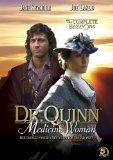| Reviews & Columns |
|
Reviews DVD TV on DVD Blu-ray 4K UHD International DVDs In Theaters Reviews by Studio Video Games Features Collector Series DVDs Easter Egg Database Interviews DVD Talk Radio Feature Articles Columns Anime Talk DVD Savant Horror DVDs The M.O.D. Squad Art House HD Talk Silent DVD
|
DVD Talk Forum |
|
|
| Resources |
|
DVD Price Search Customer Service #'s RCE Info Links |
|
Columns
|
|
|
Dr. Quinn, Medicine Woman: The Complete Season One
"I'm not a lady...I'm a doctor!"
Frontier fantasy, to be sure, and even a little dishonest in some of its themes for this family show...but professional and easy to take when it sticks to familiar ground. CBS DVD and A&E have released Dr. Quinn, Medicine Woman: The Complete Season One, a five-disc, 16-episode collection that represents the premiere go-around of this 1993 CBS mid-season replacement series. Combining the then-passé Western with the always popular medical and family drama genres―with a dash of overt feminism and social consciousness thrown in, too―Dr. Quinn, Medicine Woman garnered a core of dedicated fans from the pilot episode (it's included on this set, as well as some other bonuses) through to its messy cancellation five years later. They'll be the best fit for this heart-felt, slick entry.
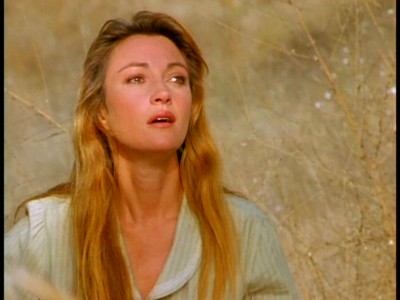
Boston, immediately following the Civil War. Michaela Quinn (Jane Seymour), under the tutelage of her physician father, has become a doctor, too―a rare occurrence for a woman even in the more liberated East. However, when Michaela's father dies, his and his daughter's practice dies with him (so much for liberal Boston), so Dr. Quinn picks up stakes and moves clear cross the country to Colorado Springs, Colorado, where she answers an advertisement for a town doctor. Once it's discovered that the lovely young lady steppin' off the coach is the podunk burg's new sawbones, all manner of fractious bedevilments a'start to ailin' the town folk. Put plain and simple in 1867 America: no one out West trusts a woman doctor...no matter how temptin' it might to have the lovely "Dr. Mike" take yer temperature. Storekeeper Loren Bray (Orson Bean) is a gen-u-wine Western grump who scoffs at the notion of havin' a female treat his hernia. Jake Slicker (Jim Knobeloch) is the town barber, and his ministrations should be good enough for anyone―so what if his most accomplished doctorin' consists of a shave and a haircut? Bar owner and pimp Hank Claggerty (William Shockley) is openly contemptuous of Dr. Mike. Exceedingly masculine rancher Olive Davis (Gail Strickland) is havin' none of Dr. Mike's scientifik mumbo-jumbo, particularly after she learns that Dr. Mike has been given custody of Olive's three nieces and nephews after their Maw―Dr. Mike's first and only friend in town―dies.
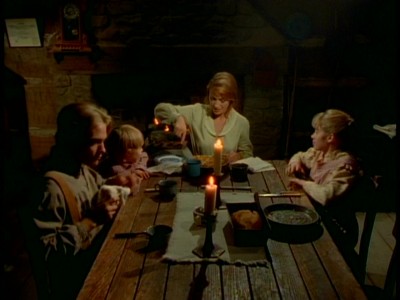
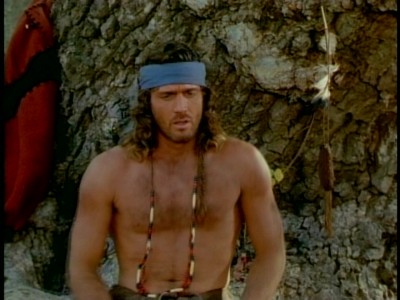
And those young'uns ain't too happy with their new arrangements, either: 17-year-old Matthew Cooper (Chad Allen), 12-year-old Colleen Cooper (Erika Flores), and 10-year-old Brian Cooper (Shawn Toovey), aren't sure what to make of this Eastern city slicker who seems to have all the answers to everythin'. Only the town's outcasts seem to cotton to the newcomer: perpetually homely telegraph operator Horace Bing (Frank Collison); wishy-washy, totally non-threatenin'-in-any-sexual-manner town preacherman Reverend Timothy Johnson (Geoffrey Lower); runaway slave-turned-town blacksmith Robert E. (Henry G. Sanders); sassy outdoor café owner Grace (Jonelle Allen); and town whore-with-a-heart-of-gold Myra Bing (Helene Udy). Oh, and also Byron Sully (Joe Lando), a compact little mountain man drippin' with sweaty, musky sex appeal (mostly from constantly wearing leather, regardless of the heat), a perpetual Elvis sneer, and a mane of hair that would rival Samson and/or Victor Mature. Forever broodin' attractively over his tragic past, Sully wages a constant war of attraction/repulsion at the thought of becomin' involved with the dewy Dr. Mike...who battles her own desire to tear off every inch of buckskin Sully wears. Can Dr. Quinn single-handedly bring Eastern enlightenment to these bigoted, racist, gender-biased, ignorant Western sh*tkickers?
MAJOR PLOT SPOILERS ALERT
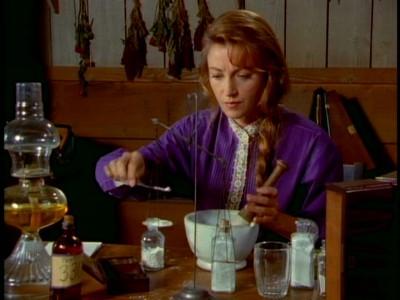
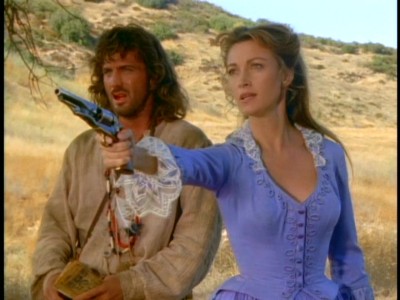
Now, let's get some things straight, right off the bat. I've never seen a complete episode of Dr. Quinn, Medicine Woman until this set came along. Oh, sure, I was aware of the series right from the start; anything the talented Seymour was in, I caught (you can read my rave of her performance in the brilliant TV miniseries adaptation of East of Eden here). But after I tried to watch one episode back in '93, I bailed; I thought she was going to be a "medicine woman" for the Indians, living among them, like Tarzan (that would have been sweet). So I'm coming to the series totally clean and open to it. I'm also aware that there's still a fan base out there for Dr. Quinn, Medicine Woman that is second-to-none when it comes to a vociferous defense of the series (only those Beauty and the Beast perverts come close). After all, if you followed TV at all back in the 90s, you couldn't help but notice those much-hyped write-in campaigns for "Save Our Sully" and all that begging and mewling and puking that went on when CBS finally dropped the hammer on the show and cancelled it in '98. I get all that, and more power to you if you think Dr. Quinn, Medicine Woman is the greatest family show ever made. I, however, don't agree, and I'm going to criticize it...and praise its good points, too. So, if you are going to send hate mail, at least carefully read all of the review first...and then make sure all the vulgarity is spelled correctly (because those are my favorite parts).
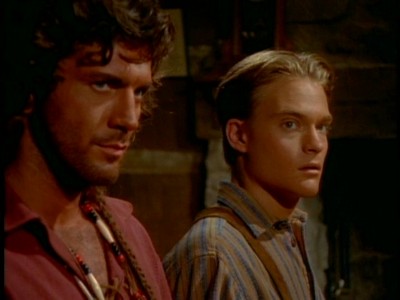
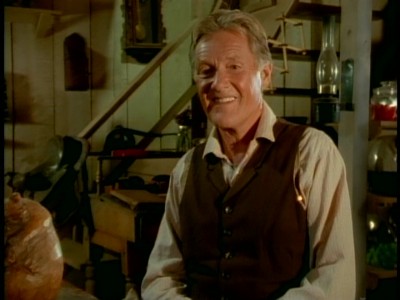
Playing like a cross between Dances With Wolves and The Last of the Mohicans...with every other TV Western/family drama/doctor series thrown in for good measure (think Gunsmoke, Starring Marcus Welby, M.D. and The Waltons), Dr. Quinn, Medicine Woman has a lot of problems that it perversely wears as badges of honor, chief among them a self-satisfied, smug―and wholly superficial―social consciousness that would be insufferable were the show consequential in any way. Created by producer Beth Sullivan (who also wrote the pilot episode), Dr. Quinn, Medicine Woman never met a social problem it didn't sugar-coat right out of complexity and believability. Throughout the 17 episodes here, "types" are on display, not truly complex characters (at least when it comes to their politics and sociology). All white males are either bigoted or ignorant or downright evil―unless they follow Indian philosophy, such as Sully―and thus need "transforming" by the enlightened Dr. Quinn. All Indians are incredibly soulful and quietly brave and dignified, and of course they're strictly non-violent. And all the women are "wronged" in some way, including even Dr. Mike, who suffers from the second-most popular lament among feminists (after "every male on the planet"): a traditionalist mother (Falcon Crest's Jane Wyman in a one-off appearance) who wants her pretty daughter married, not working. Dr. Quinn, Medicine Woman trots these characters out with billboard-sign subtlety, moving them through socially conscious subplots that don't resemble true dramatic conflict as much as they do the syllabus bullet points of your typical gender/multicultural studies college course.
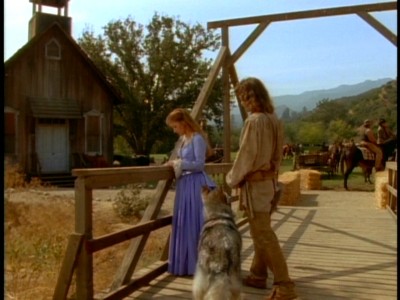
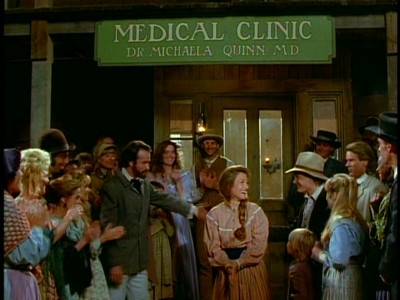
And of course, with easy psychology and easy sociology and easy dramaturgy, you're entitled as the viewer to a sense of easy virtuousness. After all, if the problems of race and gender are presented with such blithe superficiality here in this TV universe, how difficult can those problems really be in the real world, we may try to tell ourselves after being soothed by this pap (and how good we are, too, for watching such consciously, aggressively "good-for-you" TV). In this first season of Dr. Quinn, Medicine Woman, the racists and whores and Indians and ex-slaves operate on a comic-book level of involvement with each other. The way Sully's Indian friend Cloud Dancing (Larry Sellers) is portrayed, you'd never know the Cheyenne were not only a warrior people, but that they committed atrocities on other Indian tribes and whites, just as atrocities were committed upon them. A truly complex discussion of the Native American culture isn't attempted here at all; for all the show's "depth" towards this potentially fascinating (and deeply problematic) subject matter, Cloud Dancing may as well be Tonto Stars in an ABC Afterschool Special. As for the series' resident unapologetic racist, Hank the bar owner/pimp, his prejudice is shown most consistently and in increased detail (after all, this is network TV; depictions of white racism are the only types allowed with any verisimilitude). But even he's given a "pass" and "redeemed" with a comical wrap-up after he tangles with both Grace and Robert E. in Heroes (of course, the episode doesn't show any of the real consequences that would surely be coming for Robert E., either, after he beats up a white man in public. That would burst this fantasy's bubble.).
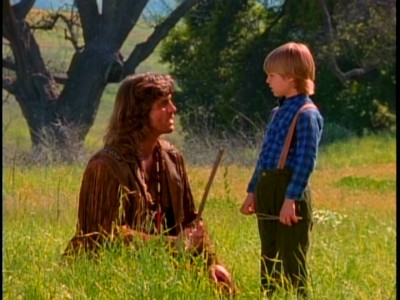
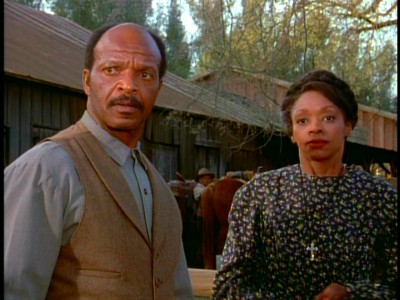
Probably the most blatant example of Dr. Quinn, Medicine Woman's calculated unreality is the Myra character, a whore whose solid-gold heart is always on display...but whose livelihood is never shown in this "family" series. Myra may be a whore, we're told time and again (the writers use this word frequently, like tough teens trying out a forbidden vulgarity for the first time), but we're supposed to admire her unconditionally. If liberal Dr. Quinn won't judge Myra's activities, then neither should we―an admirable sentiment made ridiculously easy because the show's producers don't dare show Myra actually doing anything. I wonder how many of those non-judgmental "flyover country" housefraus would be smiling in front of the TV―with their adorable little moppets at their feet―had the writers showed Myra unbuttoning her bustier and telling some flea-bitten cowboy to get his britches off, as he flipped a gold coin on the bed and started a'huffing and a'puffing away? I'm not demanding that Dr. Quinn, Medicine Woman show the reality of any of these situations in graphic detail. I like TV fantasy as much as the next television addict. But if you're going to lie about the truth of what you're portraying, don't preach to me and ask for a pat on the back for "teaching" me about our hypocrisies...when the biggest one on display is the show itself. That's the very definition of supercilious, self-satisfied do-goodism.
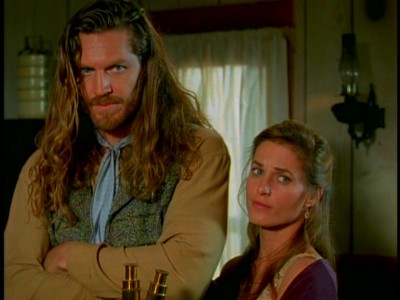
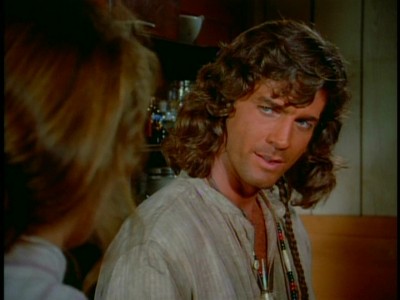
It's much better to experience Dr. Quinn, Medicine Woman as a conventional Western/family drama/romance―elements I would wager fans of the series cherish most strongly about the show (after all, the first write-in campaign from the ardent fans was famously "Save Our Sully"...not "Save Our Politically-Correct Line-Up of Stories That Skate Over Real Problems Like Whale Sh*t On an Ice Flow"). It's clear that the central pull of Dr. Mike's and Sully's growing attraction for each other is what the producers latched on to maximize audience satisfaction...and what's wrong with that? Seymour and Lando are an attractive pairing, and their chemistry is quite good together (apparently, it was good off-camera for a while, too, this first season). Women, Dr. Quinn, Medicine Woman's target audience, get to swoon over the sensitive-yet-masculine Lando all they want here, as the writers and directors increasingly up the attraction factor between the two stars (Bad Water sets all of this in motion, with plenty of furtive-but-steamy physical exchanges between the stars, including a hair-setting moment right out of Out of Africa). Female viewers of Dr. Quinn, Medicine Woman are given plenty of such chances to indulge in daydreams, where they can vicariously enjoy the ladylike femininity of Seymour (woman love her like they hate stars like Angelina Jolie), while hoping for something a little more...rough with Tarzan of the Pecos (and just when they feel a little naughty about those thoughts, the episodes are always careful to steer Dr. Mike back into surrogate mother status with the cute kids and their a'growin' pains problems).
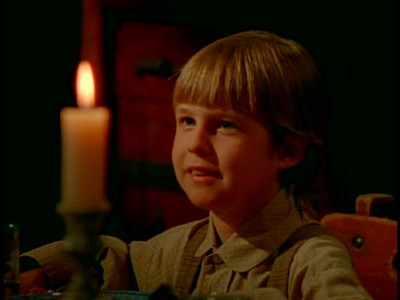
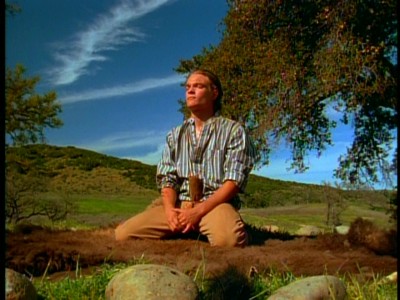
As for the "painstaking authenticity" advertised on the back of the DVD case, Dr. Quinn, Medicine Woman is no more realistic about the West and frontier life than 99.9 percent of the movies and television shows that have been made about that subject. Everyone here looks like they just stepped out of a Rodeo Drive hair salon, with perfectly coiffed dos, and immaculate makeup (gorgeous, gorgeous Seymour frequently looks stunning), no dirt smudges, no torn clothes, no bugs, no lice, no malnutrition. And true to fantasy TV doctor form, as well, no mention of payment is ever made, while Dr. Mike is blessed with a rather astounding parade of maladies and treatments in such a quite little burg, from lowly burns to diabetes to brain surgery, fercrissakes. And as sure-fire as an emergency appendectomy always is on a submarine film, all those scenes of frontier surgery are can't-miss moments of TV amusement here on Dr. Quinn, Medicine Woman (my favorite comes during the pilot episode, when Seymour has a tooth hilariously pulled from her head with a pair of pliers and no ether...and with no tears or screams from our goggling actress. Priceless.). And all of that is just fine with me. As anyone knows who has read my other reviews, I adore the fantasy element of TV (that's what makes it entertaining, after all). So Dr. Quinn, Medicine Woman can be as glossy and unrealistic as it wants to be; that only makes it better in my book. Just save the speechifyin' and preachin' at the barn door.
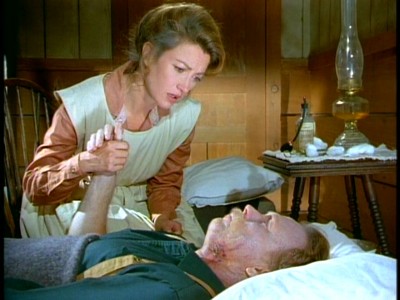
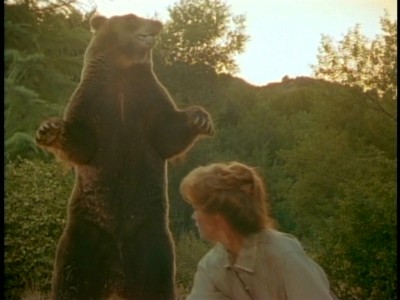
Despite the frenzied protestations of Those Who Have Been Washed in the Blood of Dr. Quinn, Medicine Woman, this CBS mid-season replacement never garnered all that great of ratings during its five-and-a-half-year run, at least according to the industry standard: the Nielsen's. The very definition of a "squeaky wheel" series that received much more hype and buzz than any audience number justified, Dr. Quinn, Medicine Woman never even cracked the Nielsen Top Twenty during its run, finishing its best (half) season this first time out, with a solid, respectable 23rd for the entire 1992-1993 season. But it was all downhill from there. Shuffled off to a "throw-away" night on the network's schedule―Saturdays, at 8:00pm―Dr. Quinn, Medicine Woman's main competition was a hodgepodge of network cast offs and original programming. ABC tried plugging in more Columbo movies made back in 1989, before they burned off the last episodes of George Lucas' spectacularly unsuccessful The Young Indiana Jones Chronicles. Over on NBC, repeats of Empty Nest and Nurses were eventually replaced by the returning failure, The Torkelsons, now re-named Almost Home (re-naming didn't help, as usual). And Fox stayed steady with demo winner, Cops (still going strong 22 years later!). Dr. Quinn, Medicine Woman would return for a full season of episodes in September of 1993...were it would drop even lower in the Nielsen's.
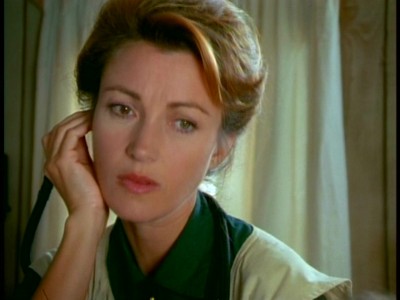
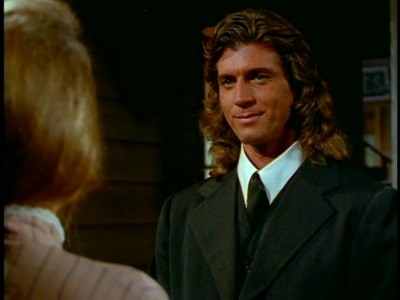
The DVD:
The Video:
I was concerned about the source materials used for these transfers when the pilot episode rolled, what with its many generation VHS-dubbed look (lots of picture noise, muddy colors, soft image). However, once the regular episodes began, everything looked better, with strong color, a sharper image, and few screen blemishes.
The Audio:
The Dolby Digital English 2.0 stereo audio mix is surprisingly nimble, with quite a bit of left-right effects and separation. Not bad for this kind of show. No subtitles or close-captions, however.
The Extras:
First up for extras is an episode of A&E's Biography series, Jane Seymour: Hollywood's English Rose, from 2003. It runs 43 minutes, and it's right in line with most of that series' puff pieces. There's an interesting text bonus, an "interactive" tour of 19th century Colorado Springs, where you get some info on how things really were back then. Text extras on bios and filmographies and awards are included, along with a photo gallery.
Final Thoughts:
When it's socially conscious, it's superficial and patronizing. When it's superficially romantic, it's entertaining. Dr. Quinn, Medicine Woman: The Complete Season One didn't engage me at all when it turned to heavy political and sociological themes, but when it turned inward and looked at the family dynamics of Dr. Mike's new family...and the rising heat coming from her closer and closer proximity to frontier stud Sully, it worked just fine. Fans are obviously going to pick this up, but if you're a Western completist or you enjoy family period dramas like the (superior) The Waltons or Little House on the Prairie, Dr. Quinn, Medicine Woman: The Complete Season One will be a good bet for you. I recommend it.
Paul Mavis is an internationally published film and television historian, a member of the Online Film Critics Society, and the author of The Espionage Filmography.


|
| Popular Reviews |
| Sponsored Links |
|
|
| Sponsored Links |
|
|
| Release List | Reviews | Shop | Newsletter | Forum | DVD Giveaways | Blu-Ray | Advertise |
|
Copyright 2024 DVDTalk.com All Rights Reserved. Legal Info, Privacy Policy, Terms of Use,
Manage Preferences,
Your Privacy Choices | |||||||









